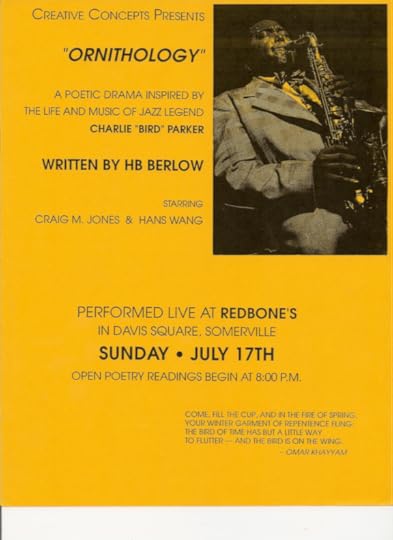“ORNITHOLOGY” – STYLE AND SUBSTANCE
My first encounter with Charlie Parker was, believe it or not, the Clint Eastwood-directed 1988 film “Bird”, with a Cannes Best Actor performance by Forest Whitaker. As a film enthusiast, the structure of the movie in some fashion emulated the improvisational style of Bird’s be-bop. I had read an article where screenwriter Joel Oliansky indicated that was his intention.
Naturally, my intention next turned toward the music itself. It was in a time between Big Band Swing and West Coast Cool. It was a kind of music that relished improvisation, marking it as something uniquely personal to the musician. Yeah, you could play a Charlie Parker riff, but it was imitation as opposed to original. There is a famous quote by Parker that defines how he came to his style:
“…and I found that by using the higher intervals of a chord as a melody line and backing them with appropriately related changes, I could play the thing I’d been hearing. I came alive.”
My understanding of the techniques of music is greatly limited. Chords and fingering are just words to me. But what I gather here is the notion of an epiphany. An artist, exploring their craft, being diligent, might eventually come upon a methodology or style that is completely their own. It is an understanding that bonds them to their instrument, which for a writer is either a keyboard or pencil and paper.
Just as Oliansky tried to convert the essence of Parker’s style into screenwriting (and, by extension, Eastwood filtering that into the medium of film), I wondered how it would be possible to express be-bop into a poetic form. During my peak years in Boston, from 1990 to 1994, I experimented with various forms, read books on prosody, biographies of Charlie Parker, and began to absorb to a small degree a mentality that would allow me to create a new work.
For me, it was not just about exploring Parker’s life but creating a parallel with the poet who was attempting to do the same thing: express a multiplicity of personal emotion and sentiment in a musical fashion through words. This would not be classic lyrical poetry from the Greeks and Romans, or perfectly metered songs from Elizabethans. This would be jazz infused and inspired yet standing on its own
“Ornithology” was the result. In it are three distinct voices. There is the Documentarian, reciting factual information regarding the life as lived of Charlie Parker. There would be Bird himself, those deliciously memorable quotes (“I lit my fire. I greased my skillet. And I cooked”), and the real impetus behind the piece. Finally, there would be the voice of the Poet, struggling to emulate the freedom and synchronicity, the balance and power of one of the world’s greatest jazz musicians.
It runs fifteen pages long, by far the longest poetical work I have successfully completed to my satisfaction. It was performed as a work in progress on the Bazooka Joe radio show on 91.5 WMFO out of Tufts University. It was performed (rather than read) by me and two others at Redbone’s in Davis Square in Somerville, MA, on July 17, 1994.

And it was eventually recorded with the assistances of two friends who were students at the Berklee School of Music on an analog four-track recorder. (It has since been converted to CD at the insistence of my wife.) The story there is the two other performers were unable to participate, leaving me doing all three voices. The only thing I have not done with it is to convert it into some kind of experimental film. These days, with the technology available to be, that is still possible.
I am particularly proud of this work for several reasons. I had an opportunity to honor a musical legend whose work is moving and fascinating. I explored a poetic way of expressing musical genius through the power of words. The flexibility of the piece made it so that it was presented on paper, recited over radio, performed live, and recorded. It is also a reminder of a time where I could freely explore my artistic sensibility without concern for how it would be sold or marketed, but purely as an act of creation.
Charlie “Bird” Parker is still, for me, a quintessential musician, a beacon of creative achievement, and a fascinating human being. This is, and should be, the essence of all great art in that it attempts to reach as deeply as possible into the psyche of humanity and show us a window into ourselves.



